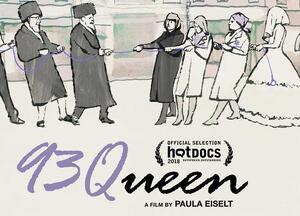Is 93Queen the Face of Hasidic Feminism?
Image from Paula Eiselt's documentary 93 Queens.
Think feminism and Hasidism are polar opposites? Think again. Paula Eiselt’s first feature film, 93Queen, focuses on the battle to establish Ezras Nashim, a Hasidic women’s EMT group, in Brooklyn’s Borough Park. The film has already been recognized at the Hot Docs film festival, is getting solid reviews in the secular and Jewish press, and—judging from the audience response at the opening weekend at IFC in New York—it is a hit with both the film and the frum (Jewishly observant) crowd.
Hatzalah, the volunteer EMTs that serve Jewish neighborhoods, wouldn’t accept women as EMTs. But women, unaccustomed to contact with men outside their family, often prefer female care during such intimate experiences such as childbirth that require medical intervention. Two women, Rachel “Ruchie” Freier who isa lawyer, mother of 6, and by the end of the film a Brooklyn Civil Court Judge, and Yocheved Lerner, a formerly secular Jew who was an EMT before she embraced life as a Hasid, work to bring Ezras Nashim into being.
The challenges are formidable, but so are these Hasidic women. Ruchie herself trains as an EMT, along with a committed group of women. They need to acquire medical certification, medical and transport equipment, and the technical dispatching skills needed to ensure response rates that save, rather than cost, lives.
As these women prepare themselves to serve their community, they encounter ideological opposition. Hatzolah’s stealth campaign to malign Ezras Nashim and Ruchie, as at odds with a Torah-based life and gender norms, is disheartening for protagonists—and viewers. Many of these diatribes are unleashed through social media sites, a trend that connects secular and religious women activists.
In search of rabbinical approval that would legitimate the unit, the stalwart would-be EMTS travel upstate. After a scene in which they put on colorful tichels (head coverings) to accommodate even stricter modesty codes than those of their home community, the screen goes dark. This aesthetic strategy not only represents that the meeting with this rabbi cannot be filmed but also that their prospects are dimmed, for they go home empty-handed.
Despite a moment when Ruchie asserts that her life would be so much easier if she were a Hasidic man, she keeps the faith, literally and figuratively. Often shown in prayer or braiding challah, this dynamo is not looking to leave the fold.
Rather, she is going to push boundaries without violating them. We see her assessing medical equipment, while politely and with good humor declining to shake the hand of the man presenting his goods. Her husband, while no Marty Ginsburg (RBG’s husband, whose support of his dynamo partner seems like a feminist fantasy), is hyperaware of the risks she and the family are taking. Nonetheless, he supports her. In a Q&A session at IFC that included Freier, Eiselt, and producer Heidi Reinberg, it became clear that it was a “family decision” that enabled some women to stay the course and turn Ezras Nashim into a reality.
Support also came from outside the community. In one scene, an African American man in charge of the EMT training tells the dispirited women that he’s black and that he’s been successful because he’s twice as good. In a spirit of mentorship and alliance, he predicts that this strategy will work for them as well.
This moment is just one of many indicators that Eiselt, an Orthodox woman and a graduate of NYU’s Tisch School of the Arts, has made a film that, while in keeping with religious modesty requirements, is nonetheless cosmopolitan in its vision and execution.
Although Ruchie has been categorized as “a real female superhero in action,” Eiselt is an honest enough filmmaker to represent the compromises that her protagonist makes and the tensions that develop within the unit as a result. Ruchie, whose professional and religious reputation is on the line, determines that only married women can serve as Ezras Nashim EMTs. This dictum creates much friction, and Yocheved, the former EMT and co-creator of the original vision, resigns from the project.
Eiselt also gives voice to the contradictions around the word “feminism” that attend Ruchie and Ezras Nashim. In making the case for a woman’s EMT unit, Ruchie goes on a Jewish radio program and argues that a Torah-based life has no need for secular feminism. Yet, after she successfully campaigns to become a Brooklyn Civil Court Judge and the first Hasidic woman elected to public office, she acknowledges that her professional journey is connected to secular feminism. Ruchie frames this seeming contradiction by insisting that “you can’t narrow me down to a few specific words.”
According to Eiselt, “At its core, 93Queen is about change from within. Change — especially feminism!—can take shape in many different ways; it doesn’t look the same in every community. 93Queen is a unique and intellectually honest portrayal of what women’s empowerment looks like in the Hasidic world.” 93Queen powerfully demonstrates that the debate is no longer between feminism and Hasidism but rather a debate within Hasidism.
Director: Paula Eiselt
Year of Release: 2018
Running Time: 90 min.







